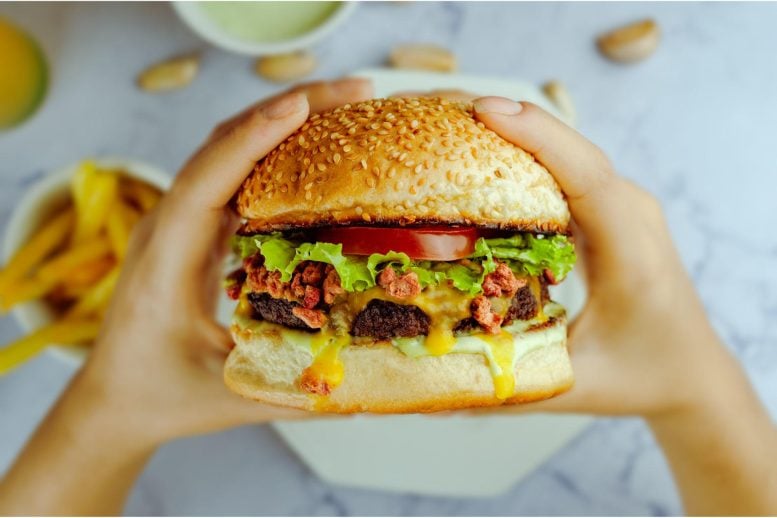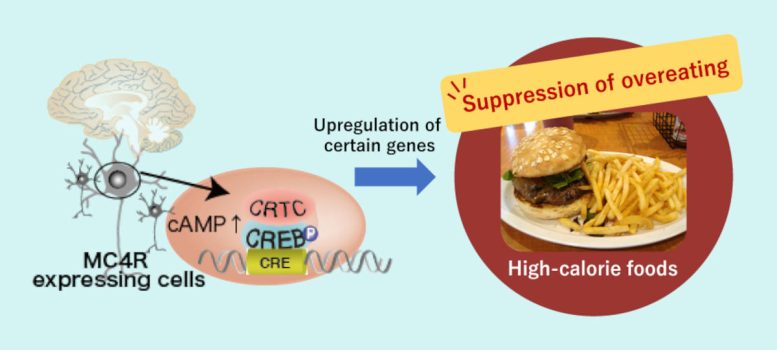
Obesity is a growing global health concern, affecting millions of people worldwide. One of the major contributors to obesity is the consumption of high-calorie foods.
High-calorie foods—high in fat, oil, and sugar—often taste delicious but can also cause overeating, leading to obesity and major health problems. But what stimulates the brain to cause overeating?
Recently, it has become clear that a gene called CREB-Regulated Transcription Coactivator 1 (CRTC1) is associated with obesity in humans. Studies on mice have shown that deleting CRTC1 results in obesity, suggesting that its presence suppresses the condition. However, the specific neurons responsible for suppressing obesity through CRTC1 and the mechanism behind it are still unknown, as the gene is expressed in all neurons in the brain.

Osaka Metropolitan University scientists have revealed that the transcription cofactor gene CRTC1 mediates the obesity-suppressing effects of melanocortin-4 receptor (MC4R) by regulating appetite for fats and oils, high-fat diet metabolism, and blood sugar. Credit: Shigenobu Matsumura, Osaka Metropolitan University
To elucidate the mechanism by which CRTC1 suppresses obesity, a research group led by Associate Professor Shigenobu Matsumura from the Graduate School of Human Life and Ecology at Osaka Metropolitan University focused on neurons expressing the melanocortin-4 receptor (MC4R). They hypothesized that CRTC1 expression in MC4R-expressing neurons suppressed obesity because mutations in the MC4R gene are known to cause obesity. Consequently, they created a strain of mice that expresses CRTC1 normally except in MC4R-expressing neurons where it is blocked to examine the effect that losing CRTC1 in those neurons had on obesity and diabetes.
When fed a standard diet, the mice without CRTC1 in MC4R-expressing neurons showed no changes in body weight compared to control mice. However, when the CRTC1-deficient mice were raised on a high-fat diet, they overate, then became significantly more obese than the control mice and developed diabetes.
“This study has revealed the role that the CRTC1 gene plays in the brain, and part of the mechanism that stops us from overeating high-calorie, fatty, and sugary foods,” said Professor Matsumura. “We hope this will lead to a better understanding of what causes people to overeat.”
Reference: “CRTC1 deficiency, specifically in melanocortin-4 receptor-expressing cells, induces hyperphagia, obesity, and insulin resistance” by Shigenobu Matsumura, Motoki Miyakita, Haruka Miyamori, Satomi Kyo, Fuka Ishikawa, Tsutomu Sasaki, Tomoki Jinno, Jin Tanaka, Kotomi Fujita, Takumi Yokokawa, Tsuyoshi Goto, Keiko Momma, Shigeo Takenaka and Kazuo Inoue, 9 November 2022, The FASEB Journal.
DOI: 10.1096/fj.202200617R
The study was funded by the Takeda Life Science Foundation, the Sugiyama Sangyo-Kagaku General Incorporated Foundation, and the Japan Society for the Promotion of Science.









I’m confused about the paragraph that talks about mice without CRTC1 in MC4R-expressing neurons.
When fed a standard diet, they were not obese. When fed a high-fat diet, they were obese.
It sounds like the diet, not the absence of the gene, resulted in obesity. At the very least, it sounds like a high-fat diet triggered the overeating, which is still the diet as the cause.
I remember reading a study many years ago that suggested carbohydrates trigger a reward response in the brain, but the study did not explain why some people can stop eating when they’re full and some cannot.
I remember yet another study talking about cultural influence, namely the 1980s where exercise and nice bodies were influencing people to get in better shape or at least be health-conscious.
I think the issue of obesity is more complex than a gene. The question is how or whether we can actually use the discovery to treat obesity, because all the fat-shaming activists do is point to something to distract from personal accountability to maintain a sense of victimhood. None of this helps the people who have obesity.
Carbohydrates combined with Poly-Unsaturated fats (PUFA / VARNISH -> soybean/safflower/sunflower/corn/seasame/canola/flaxseed/cottonseed/linseed) directly cause cancer, diabetes, heart disease, liver disease, obesity and dementia.